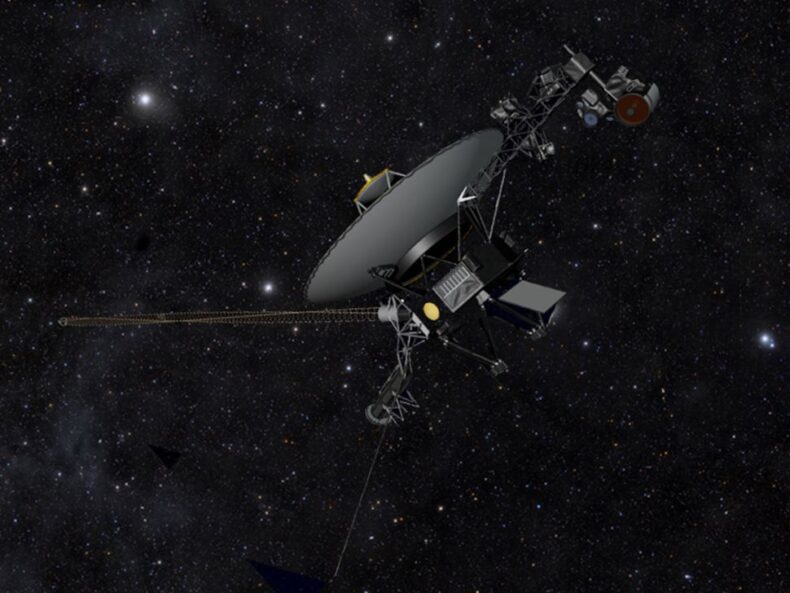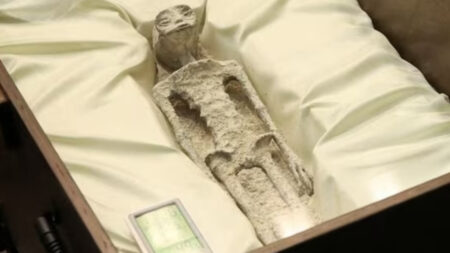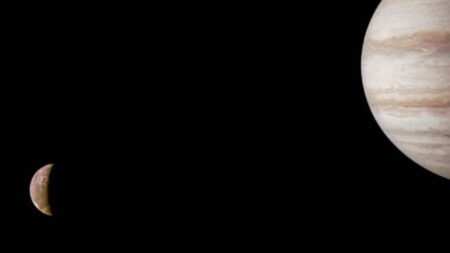The original publication of this article was on The Conversation. This article was authored by James Edward Huchingson, Florida International University Professor Emeritus and Lecturer in Religion and Science.
Voyager 1 is the furthest located human-made object from Earth. It is presently over 15 billion miles (24 billion kilometers) from Earth in interstellar space after passing through Jupiter, Saturn, Uranus, and Neptune. In the form of Golden Records, both Voyager 1 and its twin, Voyager 2, contain little fragments of mankind. These messages in a bottle contain spoken greetings in 55 languages, natural sounds and sights, an album of recordings and photos from other civilizations, and a written welcome message from Jimmy Carter, who was president of the United States when the spacecraft departed Earth in 1977.

The Golden Records were designed to endure a billion years in space, but scientists determined that they may remain for billions of years without going near any stars in a new investigation of the courses and risks these explorers may experience.
Having spent a career in religion and science, The Author has given a lot of consideration to how spiritual notions cross with scientific advances. The amazing lifespan of the Voyager spacecraft provides a very concrete starting point for investigating theories of immortality.
Many people believe that immortality is the eternal existence of a soul or spirit after death. It may also refer to the preservation of one’s legacy in memory and documents. Each Voyager leaves such a legacy with its Golden Record, but only if it is found and appreciated by an extraterrestrial civilization in the far future.

Life after death
There are various and distinct religious views on immortality. Most faiths envision a postmortem career for a person’s soul or spirit, ranging from reincarnation to eternal residency among the stars.
For many Christians and Muslims, the ideal afterlife is to spend eternity in God’s presence in heaven or paradise. The beliefs of Judaism about the afterlife are less clear. According to the Hebrew Bible, the dead are only “shadows” in a region known as Sheol. Some rabbinical leaders believe in the resurrection of the righteous as well as the immortality of souls.
Immortality extends beyond the person. It may also be collective. For many Jews, the ultimate fate of Israel and its people is of the utmost significance. Numerous Christians expect the eventual resurrection of the dead and the arrival of God’s kingdom for the faithful.
Jimmy Carter, whose message and signature are preserved in the Golden Records, is a progressive Southern Baptist and a live illustration of Christian hope for eternity. Now that he is fighting brain cancer and reaching the age of 100, he has contemplated death. In a sermon after his diagnosis, Carter concluded: “It was irrelevant to me whether I lived or died. My Christian faith involves absolute assurance in the hereafter. Therefore, I will live again once I die.”
It is feasible to deduce that the possibility of an extraterrestrial viewing the Golden Record and learning Carter’s name billions of years from now would provide him with little further solace. Carter’s confidence in his soul’s immortality is reflected in his awareness of his ultimate fate. In this regard, he presumably symbolizes individuals of many religions.
Secular immortality
Appealing to the continued presence of a soul or spirit after death offers little comfort to atheists and nonbelievers. Carl Sagan, who conceived of the Golden Records and oversaw their creation, remarked of the afterlife, “I have no evidence that it is more than wishful thinking.” Thoughts of missing significant life events, such as seeing his children grow up, pained him more than the anticipated destruction of his conscious self upon the death of his brain.
There are further alternatives for immortality open to individuals like Sagan. They include freezing and maintaining the body for future physical resurrection and uploading and converting a person’s mind into a digital form that would outlive the brain. These putative routes to physical immortality have not yet been proven practical.
The Voyager and legacy
The majority of individuals, regardless of their religious or nonreligious beliefs, want their deeds to continue to have significance in the future as their enduring legacy. People want to be recognized, valued, and even adored. “To live in the hearts, we leave behind is to live forever,” said Carl Sagan.
It is expected that Voyagers 1 and 2 will remain for more than a trillion years, making them almost immortal among human-made objects. Even before the sun’s predicted extinction when it runs out of fuel in around 5 billion years, all living creatures, mountains, oceans, and forests will have been eradicated for a very long time. It will be as if we and all the wondrous and lavish beauty of planet Earth never existed, which is a depressing concept for me.

In the far future, however, the two Voyager spacecraft will still be drifting in space, awaiting discovery by an extraterrestrial civilization to whom the Golden Records were addressed. As a type of objective immortality, only these recordings will likely endure as a testament and legacy of Earth.
People who are religious and spiritual might find comfort in the conviction that God or an afterlife awaits them after death. For atheists expecting that someone or something would remember mankind, any awake and thankful extraterrestrials will suffice.
Read More : Voyager 1 sends strange signals from beyond solar system, perplexing engineers













